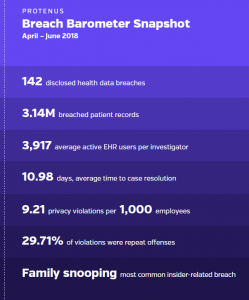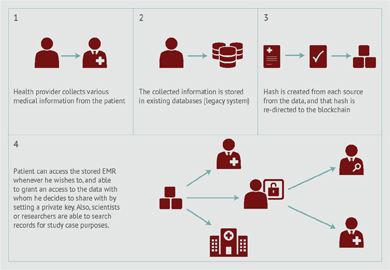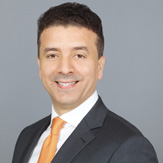 According to Protenus, a company that tracks health data breaches, over 3.14M patient records were breached between April and June 2018. Nearly 78% of healthcare workers are not fully aware of the importance of safeguarding patient healthcare records, and healthcare providers are woefully understaffed in security and training protocols. Hacking incidents nearly doubled in Q2 2018. In this article we will be discussing Healthcare-Blockchain technology and how HealthSapiens is leading the charge.
According to Protenus, a company that tracks health data breaches, over 3.14M patient records were breached between April and June 2018. Nearly 78% of healthcare workers are not fully aware of the importance of safeguarding patient healthcare records, and healthcare providers are woefully understaffed in security and training protocols. Hacking incidents nearly doubled in Q2 2018. In this article we will be discussing Healthcare-Blockchain technology and how HealthSapiens is leading the charge.
Thieves go to great lengths to target this data due to its value on the dark web. The data is rich with personal information used to steal identities, defraud insurance companies, and more. Complete health information and medical data can be worth as much as $82.90 each, according to Trendlabs Research Paper. “For healthcare organizations,” they write, “the repercussions of a data breach are daunting. In addition to the loss of reputation and patient trust, they risk incurring huge revenue losses from expenses such as those related to the investigation, forensics and mitigation of the damage done by such a security incident, billing issues, and costs involved to provide affected patients with reparational support such as identity theft protection and credit monitoring services.”
Data privacy laws, such as those in the United States, are designed to standardize privacy, but they also make it difficult to implement electronic solutions. According to the AMA of Journal Ethics, “There are three major ethical priorities for electronic health records: privacy and confidentiality, security, and data integrity and availability.” Medical records are the property of the healthcare provider, and as such it is their responsibility to provide security. Due to the value of the data combined with cutting-edge world of hacking, this means providers essentially need to become experts in cybersecurity if they want to host electronic records. This is a lot to ask of organizations who are primarily based on healthcare.
The Solution: Blockchain Technology
“While nothing is 100% secure, blockchain is designed to be immutable, tamper-proof and democratic,” says Andrew Gazdeki writing for Forbes. Data stored on a blockchain is distributed across participating servers with no central location, making it an elusive target for hackers. The information can be shared via key created by a hash, which is impossible to reverse-engineer. Since the data is owned by individual patients, only they decide who has access to the records.
According to IBM, 16% of healthcare executives are planning to incorporate blockchain technology within the next year. The beauty is that not all providers must convert to the same platform for it to work.
A brief example of how blockchain technologies might allow interoperability of EMRs from various worldwide legacy systems:
- Identifying the person that is the subject of the data,
- Identifying the user requesting person’s data,
- Recording and auditing the authorization process to release the person’s data,
- Establishing the authenticity of the data that is being released,
- Paying the service that offered the personal data,
- And auditing that the shared data was used as expected
This Legacy system will function as an automated intermediary between the current HIPAA-compliant software database and the blockchain and distributed storage network. Following encryption of electronic private health information, users will hash the information and create defined chains of entries to the blockchain as a functional way of verifying data integrity and eliminating the chance for foul-play or unauthorized data manipulation.
This model affords consumers trust, accountability, integrity, access control and traceability. This model minimizes the interference of third party actors and intermediaries, while simplifying over complicated healthcare delivery. This solution is patient-centered, transparent, and cost effective.
Blockchain for EMR Permissioning

“For patients, it’s the immutability and interoperability across institutional and geographic boundaries that’s perhaps the most attractive attribute of blockchain technology,” says Bruce Silcoff, CEO of Shyft Network. Patient data can be easily accessed from anywhere in the world, all while feeling their data is secure.
It is time for healthcare providers to embrace technology that will not only secure sensitive data, but create better access and sharing overall. With blockchain technology we can decrease breaches and increase accessibility for healthcare patients worldwide.
To find out more about the future of HealthSapiens 2.0 (powered by blockchain technology) please visit our website and sign up for email alerts, or check us out on social media @healthsapiens
About The Author
 Karim Babay is Chairman & CEO of HealthSapiens, a nationwide healthcare provider that delivers on-demand access to healthcare anytime, anywhere, via mobile devices, the internet, video and phone. Mr. Babay is also the founder and Chief Investment Officer of Intrinsic Value Investment Partners, a value-focused hedge fund. Mr. Babay has over 15 years of global investing, entrepreneurial and corporate finance experience allocating capital across the capital structure (credit and equity), angel investing, liquid and illiquid investments in securities. Mr. Babay has published numerous studies and analysis while at Columbia University. Mr. Babay is member of the board of directors and Chairman of the compensation committee of GLYECO, a publicly traded company, principally involved in processing of waste into high quality ethylene glycol. Mr. Babay received a B.S. in finance and economics from HEC Institute and an MBA from Columbia Graduate School of Business.
Karim Babay is Chairman & CEO of HealthSapiens, a nationwide healthcare provider that delivers on-demand access to healthcare anytime, anywhere, via mobile devices, the internet, video and phone. Mr. Babay is also the founder and Chief Investment Officer of Intrinsic Value Investment Partners, a value-focused hedge fund. Mr. Babay has over 15 years of global investing, entrepreneurial and corporate finance experience allocating capital across the capital structure (credit and equity), angel investing, liquid and illiquid investments in securities. Mr. Babay has published numerous studies and analysis while at Columbia University. Mr. Babay is member of the board of directors and Chairman of the compensation committee of GLYECO, a publicly traded company, principally involved in processing of waste into high quality ethylene glycol. Mr. Babay received a B.S. in finance and economics from HEC Institute and an MBA from Columbia Graduate School of Business.

